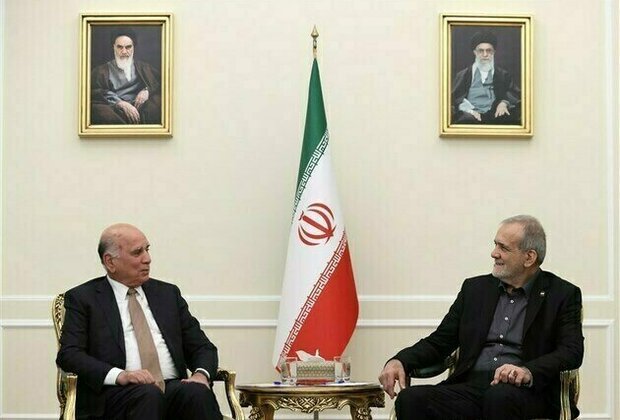Iranian President Masoud Pezeshkian held a meeting in Tehran with Iraqi Deputy Prime Minister Fuad Hussein, where the two leaders discussed bilateral cooperation and regional relations.
On Monday, during the second day of the Tehran Dialogue Forum, President Pezeshkian expressed Iran’s willingness to share its technological capabilities—especially in medicine and agriculture, including peaceful nuclear technology—with other Islamic and neighboring countries.
In the meeting, the Iraqi minister highlighted the ongoing expansion of trade and economic relations between the two countries.
Regarding indirect U.S.-Iran talks, Pezeshkian said that if the United States behaves sincerely, Iran would also consider addressing nuclear-related concerns. He further emphasized that Iran does not require permission from anyone for its progress and development.
The administration of former U.S. President Donald Trump had exerted continuous pressure on Iraq to limit its economic and diplomatic ties with Iran.
On March 8 of this year, the U.S. government withdrew a sanctions waiver that had allowed Iraq to import electricity from Iran.
A few weeks later, Iraq was granted a temporary new waiver, enabling it to continue importing electricity from Iran to meet its energy needs.
Iran is Iraq’s primary supplier of natural gas, which accounts for approximately 45% of Iraq’s daily electricity demand of 14,000 megawatts.
Last month, a delegation led by Iraqi Prime Minister Mohammed Shia' Al-Sudani’s advisor Hazem Al-Khalidi visited Tehran. Discussions focused on border trade and infrastructural development between the two countries.
The talks included finalizing agreements on the Shalamcheh–Basra railway project and the establishment of a joint free trade and industrial zone along the border.
Neighboring Iraq and Iran are moving forward with plans to raise their annual bilateral trade volume to $25 billion.










